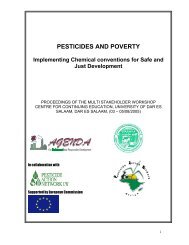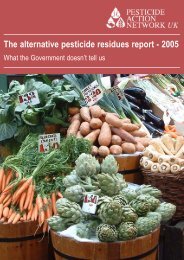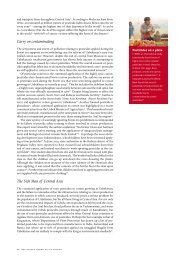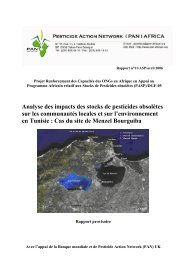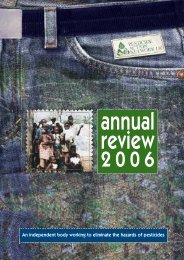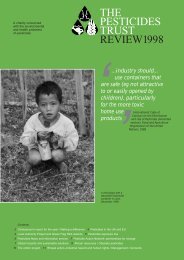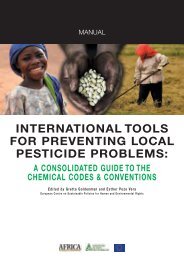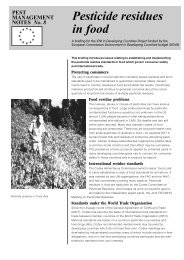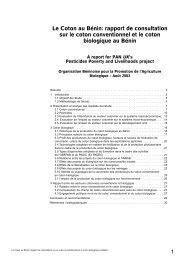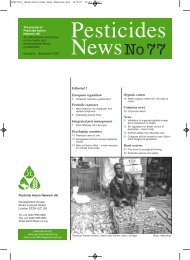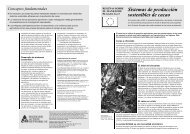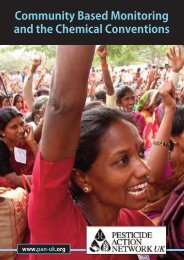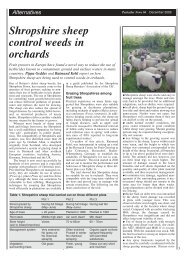Big 6 agrochemical companies indicted for crimes against humanity
Big 6 agrochemical companies indicted for crimes against humanity
Big 6 agrochemical companies indicted for crimes against humanity
Create successful ePaper yourself
Turn your PDF publications into a flip-book with our unique Google optimized e-Paper software.
PRESS RELEASE – Embargoed until 00:01 16/11/2011<br />
<strong>Big</strong> 6 <strong>agrochemical</strong> <strong>companies</strong> <strong>indicted</strong> <strong>for</strong> <strong>crimes</strong> <strong>against</strong><br />
<strong>humanity</strong><br />
From 3-6 th December 2011, the Permanent Peoples’ Tribunal (PPT) will convene in Bangalore, India, to<br />
hear cases brought <strong>against</strong> six multinational <strong>agrochemical</strong> <strong>companies</strong> who stand accused of violating<br />
human rights by promoting reliance on the sale and use of pesticides known to undermine internationally<br />
recognised rights to health, livelihood and life.<br />
Known as the ‘<strong>Big</strong> 6’, the indicated <strong>agrochemical</strong> corporations are Monsanto, Dow, BASF, Bayer, Syngenta<br />
and DuPont. Collectively, these <strong>companies</strong> control 74% of the global pesticide market, making the<br />
pesticide/agricultural biotechnology industry one of the most consolidated sectors in the world.<br />
The World Bank estimates that 355 000 people per year die of unintentional pesticide poisoning. “The<br />
aim of taking the <strong>Big</strong> 6 to the PPT is to give a voice to the otherwise voiceless victims of pesticides around<br />
the world who have suffered as a result of the relentless promotion of toxic poisons by these<br />
multinational <strong>companies</strong>.” Said Nick Mole, PAN UK Policy Officer.<br />
Cases from the UK and Europe will focus on the loss of bees due to neonicotinoid pesticides developed<br />
and sold by Bayer; Graham White, a beekeeper said, “Bee losses in the UK and Europe have been<br />
catastrophic, with over a million colony deaths since 1993; there is a massive body of peer-reviewed<br />
scientific evidence from European universities, which indicate that neonicotinoids are having a lethal<br />
impact on bees and other pollinating insects. It is high time that the <strong>companies</strong> that manufacture these<br />
toxic pesticides are held to account <strong>for</strong> the damage they have done.”<br />
Cases from the UK will also focus on the damage that has been done to the health of UK citizens by<br />
organophosphate (OP) pesticides, most notably sheep dips. In the UK many hundreds of individuals and<br />
their families have had their lives devastated by exposure to OP pesticides and have had no recognition<br />
or compensation <strong>for</strong> their suffering. “We hope that by taking these <strong>companies</strong> to the PPT we will raise<br />
the issue of OP poisoning in the UK and bring to the attention of the public and politicians the suffering<br />
that has been caused” stated Elizabeth Sigmund of the Organophosphate In<strong>for</strong>mation Network.<br />
During the course of the tribunal, Pesticide Action Network will invite witnesses including scientists,<br />
medical doctors, and lawyers, to prove the charges through expert testimony on pesticides, genetic<br />
engineering, intellectual property rights, and other subjects germane to the cases at hand. The PPT will<br />
also hear testimony from farmers, farm workers, beekeepers, mothers, young people, scientists and<br />
consumers from around the world. The defendants will be served and summoned to offer their<br />
perspectives and responses.<br />
Also under indictment are the International Monetary Fund, World Bank, and World Trade Organisation;<br />
these entities are charged with facilitating corporate concentration of power through their policies and<br />
programs. Additionally, the governments of Switzerland, Germany, and the United States – the home<br />
nations of six defendant <strong>companies</strong> – have been <strong>indicted</strong> <strong>for</strong> colluding with, and failing to regulate,<br />
corporate power.<br />
The verdict from the hearing will be given on 6 th December.<br />
-- ENDS –
For more in<strong>for</strong>mation please contact:<br />
Keith Tyrell, Director, PAN UK: 020 7065 0905<br />
Nick Mole, Policy Officer, PAN UK<br />
Tel: 020 7065 0905<br />
Mob: 07906 892648<br />
Email: nickmole@pan-uk.org<br />
Notes <strong>for</strong> Editors:<br />
• Pesticide Action Network UK is the only organisation in the UK focussed solely on global pesticide<br />
issues<br />
• A full copy of the charges <strong>against</strong> the <strong>Big</strong> 6 is available on request<br />
• Biographic details of the PPT jury panel are available on request<br />
• The World Bank estimates that 355 000 people die of pesticide related illness every year 1<br />
• The Permanent Peoples’ Tribunal was founded in 1979 and grew out of the work by Senator Lelio<br />
Basso of Italy. The PPT is an international opinion tribunal that aims to raise awareness of situations<br />
of massive human rights violations when such situations receive no institutional recognition or<br />
response. Starting in 1979, the PPT has held 35 sessions exposing various <strong>for</strong>ms of human rights<br />
abuses through alternative judgements and legal articulations. It was created as an institution to<br />
compensate <strong>for</strong> the absence of access to justice <strong>for</strong> all people; where barriers to justice exist, the<br />
Tribunal serves as a grassroots, ad hoc court to consider charges and to issue verdicts<br />
• Neonicotinoid pesticides have been implicated in the death of bees since they were introduced into<br />
agricultural use on the early 1990s<br />
• In the EU honey bees play a key role in the successful production of 80 million tonnes of food every<br />
year - that is approximately 160kg of food per EU citizen<br />
• In the winter of 2008/2009 around 1/5 of honey bee hives in the UK were lost<br />
• In Germany in 2008 60% of their bees were lost<br />
• In 1999 France banned the use of the neonicotinoid based product Gaucho after the loss of 1/3 of<br />
French honey bees<br />
• Other countries in Europe have banned or restricted the use of neonicotinoids including Germany,<br />
Italy and Slovenia. 2 In Italy following the neonicotinoid ban bee populations have seen recoveries with<br />
greatly reduced bee mortality 3<br />
• Glyphosate, the active ingredient in the herbicide Roundup can cause birth defects even at very low<br />
levels. However, this in<strong>for</strong>mation has been known and ignored by regulators and the manufacturers<br />
since the early 1990s 4<br />
• OPs are nerve poisons which kill the target pest (usually insects). Most OP pesticides are insecticides,<br />
although there are also a number of related herbicide and fungicide compounds 5<br />
1 World Bank, World Development Report 2008: Agriculture <strong>for</strong> Development (Washington, DC: World Bank,<br />
2007)<br />
2 http://www.organicinthegarden.com/<strong>for</strong>um/index.php?topic=49.0<br />
3 http://www.cra-api.it/online/immagini/Apenet_2009_eng.pdf<br />
4 http://www.earthopensource.org/index.php/reports/17-roundup-and-birth-defects-is-the-public-beingkept-in-the-dark<br />
5 http://www.pan-uk.org/pestnews/Actives/organoph.htm



